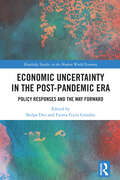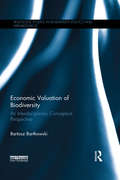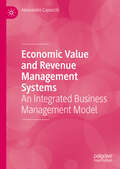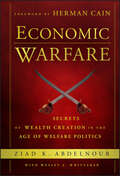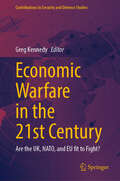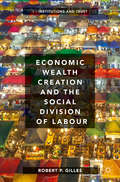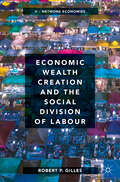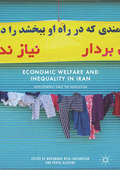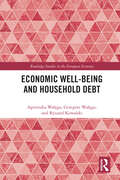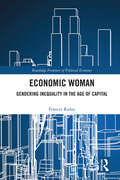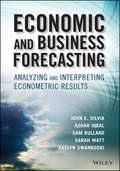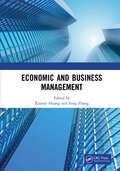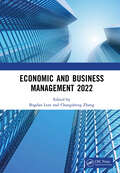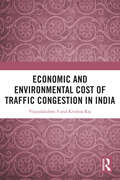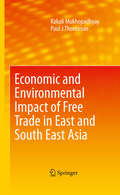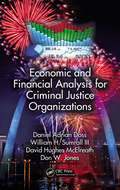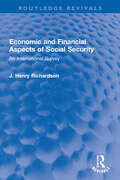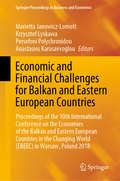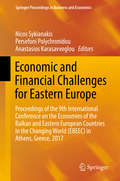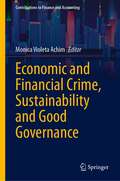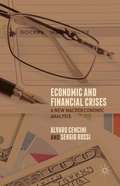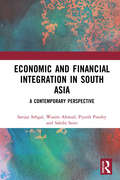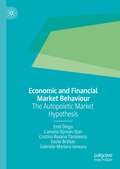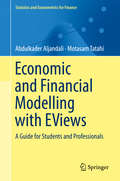- Table View
- List View
Economic Uncertainty in the Post-Pandemic Era: Policy Responses and the Way Forward (Routledge Studies in the Modern World Economy)
by Shilpa Deo Fatma Feyza GündüzThe global economy has experienced many challenges in recent times, particularly in the shadow of the COVID-19 pandemic, such as dwindling demand, supply chain disruptions, declining growth rates, further pandemic waves, and increasing poverty and inequality to name but a few. Four years after the pandemic, economies are still struggling to achieve sustainable economic growth and development. While much has been written about the impact of COVID-19 on various sectors and economies, this is the first book to underscore the post-COVID global uncertainties that are still occurring on the world stage and further, to present the recent challenges such as geo-political tensions, war, economic disturbances, climate change, the energy crisis in Europe, recession in developed economies and its effect on developing and least developed economies.The book starts by setting the grounds for further discussion of the present challenges as well as future implications. In addition to examining the immediate issues which occurred with the onset of the pandemic, it explores these from the perspective of developed, developing, and least developed countries. The wide-ranging topics covered by the book include the ongoing Russia-Ukraine War, China’s increasing economic dominance in neighbouring countries, the economic collapse of Sri Lanka and Pakistan, the factors that led to the technology layoffs and the future of global employees and economies. The book goes beyond looking at sector-specific factors and broadly outlines country-specific instabilities, policy choices and the way forward.The book will be of interest to students of macroeconomics, development and international economics, and international relations as well as researchers and policymakers.
Economic Valuation of Biodiversity: An Interdisciplinary Conceptual Perspective (Routledge Studies in Biodiversity Politics and Management)
by Bartosz BartkowskiWhile biodiversity loss is an ecological phenomenon, it also has further dimensions – political, social and, last but not least, economic. From the economic perspective, the rapid loss of biological diversity can be viewed in two ways. First, the consequence of this deterioration process is a loss of options and an increase in scarcity of the environmental ‘good’, biodiversity. Second, economic activity and the structure of global and local economic institutions have frequently been identified as the major drivers of biodiversity loss. In economic terms, this constitutes a market failure – market-based economic activities lead to processes which undermine the long-term stability of these very activities. This book provides an ecological economic perspective on the value of diversity in ecosystems. Combining insights from various sub-disciplines of ecology and environmental/ecological economics, the author constructs a conceptual framework which identifies the ways in which biodiversity influences human well-being and offers a novel, unifying perspective on the economic value of biodiversity. This framework demonstrates that biodiversity’s economic value mainly results from uncertainty about the future, regarding both supply of and demand for ecosystem services, and interconnections between ecosystems. The book goes on to identify suitable methods for economic valuation of biodiversity and discusses the currently underdeveloped and underused approach of deliberative monetary valuation. Combining a strong theoretical framework with practical examples, this book will be of great interest to students and researchers of ecological economics, ecosystem services, environmental values and environmental and resource economics.
Economic Value and Revenue Management Systems: An Integrated Business Management Model
by Alessandro CapocchiFilling a gap in existing literature on revenue management systems, this book explores the use of business strategies which are specifically designed to have a positive impact on economic and financial efficiency. Focussing on services within the tourism industry, the author takes a new approach and identifies dynamic pricing and service differentiation as key components of strategic management. Providing fresh insights into an ever-expanding sector, this book will be a useful tool for those studying business strategy and management, as well as value creation theory, as it ultimately presents an integrated business management model which will ensure sustainability.
Economic Warfare
by Herman Cain Wesley A. Whittaker Ziad K. AbdelnourNew insights for investors and business people looking to create wealth in the turbulent post-crisis worldIn a no holds barred expose of the 2008 financial meltdown from the inside, Ziad K. Abdelnour argues that the political and financial elites have done nothing to fix the structural problems and instead have worsened the situation. By creating more market bubbles, they are actually waging a war on the most productive members of society.For investors, business people, and entrepreneurs that need to navigate the troubled geopolitical waters of the post-crisis world, Abdelnour offers several solutions, including looking at the world anew and understanding that the federal government's primary objective is to promote the creation of an environment conducive to the creation of wealth not job creation, not bailouts, not subsidies, not expansion of the federal bureaucracy, and not providing lifetime support to those who choose not to take advantage of the innumerable opportunities that exist in this nation for them to create a better, more productive life for themselves.Written for investors that need to navigate the troubled geopolitical waters of the post-crisis world· Offers "out of the box" investment tactics and strategies to outsmart the system· Describes political and business solutions that anyone can engage in to restore freedom and prosperityThe author is President and CEO of Blackhawk Partners, Inc., a private family office that has two major lines of business, private equity investments and advisory services, and physical commodities tradingCompelling and persuasive, Economic Warfare reveals that wealth can be created in the new, post-crisis world, but investors need to understand that the rules of the game have changed.
Economic Warfare in the 21st Century: Are the UK, NATO, and EU fit to Fight? (Contributions to Security and Defence Studies)
by Greg KennedyThis volume critically examines whether the United Kingdom, NATO, and the EU are equipped to engage in both defensive and offensive economic warfare. In an era where economic leverage is increasingly used as a tool of statecraft, nations worldwide are struggling with the complexities of economic warfare. The book discusses contested terminology and concepts, often blurred with geoeconomics, economic statecraft, and weaponized interdependence. Through a thorough analysis of organizational structures, doctrines, and strategic cultures, the book explores the legitimacy and implications of using economic means to influence state behavior. As global actors ramp up their economic warfare capabilities, it questions whether such strategies are a necessary evolution or a disruptive force to international norms. The book will appeal to students, researchers, and scholars of international relations, political science, security studies, and defence studies, as well as policy-makers and practitioners interested in a better understanding of the future of global economic security.
Economic Wealth Creation and the Social Division of Labour: Volume I: Institutions And Trust
by Robert P. GillesThis textbook introduces and develops new tools to understand the recent economic crisis and how desirable economic policies can be adopted. Gilles provides new institutional concepts for wealth creation, such as network economies, which are based on the social division of labour. This volume investigates the formation of networks and hierarchical authority organisations, with a focus on the role of trust. Gilles also looks at the theory of growth and development, using real world examples and problem sets to put into practice. This title is suitable reading for undergraduate, MSc and postgraduate students in microeconomic analysis, economic theory and political economy.
Economic Wealth Creation and the Social Division of Labour: Volume II: Network Economies
by Robert P. Gilles‘This is the second book of a two-volume set that continues Adam Smith's work, using the tools mathematical, experimental, and behavioural economists have developed since 1776. As in the first volume, markets are not the central organising principle. Instead, attention centres on social institutions and the division of labour that they enable. The book studies this via the endogenous division of labour that existing institutions help form. The first book in the series examined this problem deeply, resorting minimally to formal mathematical modelling; the second volume is where the formal modelling blossoms. General equilibrium theory meets network theory and receives a breath of fresh air, including a new viewpoint on economic inequality, the newly resurgent bane of capitalism. What I said for the first volume applies to this second volume equally: if you care to understand the economy, this book belongs to your bookshelf.’—Dimitrios Diamantaras, Temple University, Philadelphia, USAThis textbook introduces and develops new tools to understand the recent economic crisis and how desirable economic policies can be adopted. Gilles provides new institutional concepts for wealth creation, such as network economies, which are based on the social division of labour.This second volume introduces mathematical theories of the endogenous formation of social divisions of labour through which economic wealth is created. Gilles also investigates the causes of inequality in the social division of labour under imperfectly competitive conditions. These theories frame a comprehensive, innovative and consistent perspective on the functioning of the twenty-first century global economy, explaining many of its failings. Suitable reading for advanced undergraduate, MSc and postgraduate students in microeconomic analysis, economic theory and political economy.
Economic Welfare and Inequality in Iran
by Mohammad Reza Farzanegan Pooya AlaediniThis book examines economic inequality and social disparity in Iran, together with their drivers, over the past four decades. During this period, income distribution and economic welfare were affected by the 1979 Revolution, the eight-year war with Iraq, post-war privatization and economic liberalization initiatives carried out under the Rafsanjani and Khatami administrations, the ascendance of a populist economic platform under the Ahmadinejad administration, and the lifting of energy and financial sanctions under the Rouhani administration. Featuring a mix of scholars, including Iranian academics who experienced these changes and are publishing in English for the first time, this collection offers quantitative and descriptive studies of the country's post-revolutionary economic development and disparities. In most chapters, a hypothesis is developed from existing theories or observations, which is then tested using available data. This unique combination of new voices, academic as well as personal experiences, and scientific methods will be a valuable addition to the library of the scholars of modern Iran's economy and society.
Economic Well-being and Household Debt (Routledge Studies in the European Economy)
by Agnieszka Wałęga Grzegorz Wałęga Ryszard KowalskiThe growing indebtedness of households reported over the last 30 years and in most developed countries has serious economic and social implications. This book provides insight into the concepts, measures, and determinants of household indebtedness, over-indebtedness, and well-being by integrating theoretical perspectives, adopting recent analytical methods, and using a sample of Polish households. The authors identified the socio-demographic and economic characteristics of indebted and over-indebted households, as well as the basic characteristics of indebtedness and the differences in its subjective perception among over-indebted households and those that are not over-indebted. They determined the spatial differentiation of over-indebtedness, examining the relationship between economic, social and behavioural factors and over-indebtedness and the role of over-indebtedness in shaping the economic well-being of households. The results of a questionnaire conducted on a sample of Polish households and econometric modelling served as the basis for assessing the economic well-being of indebted households. This assessment was conducted with the use of a composite well-being indicator developed by the authors. Given the multidimensional nature of the issues being analysed, the authors offer an approach that accounts for two separate but overlapping dimensions of economic well-being, namely material and financial, and two ways of assessing each of them: objective and subjective. The book holds appeal for researchers, scholars, and students of economics, finance, consumer economics, and economic psychology and offers practical guidance for policymakers and advisors who deal with consumer affairs.
Economic Woman: Gendering Inequality in the Age of Capital (Routledge Frontiers of Political Economy)
by Frances RadayThe author introduces the concept of economic woman and makes her visible in duality with and opposition to the exclusive model of economic man. Economic man has epitomized neo-liberal capitalism, which embraces competition and maximization of profit, resulting in a steep increase in economic inequality. The book demonstrates that women’s inequality is a crucial factor in economic inequality, which cannot be fully understood without relating to women’s situation, and that economic woman cannot thrive in the conditions of economic inequality created under global neo-liberalism. Emphasising the international human rights guarantees of women’s right to equality in all fields of life, the author documents woman’s increased participation in political, public, financial and corporate institutions, employment and entrepreneurship, with some women reaching high profile positions. Nevertheless, using global data, she reveals that economic woman lags behind, with a severe economic power deficit, an unfulfilled promise of equal employment opportunity, a gendered impact of poverty and barriers to gender equality in the family. The book analyses the trap of women’s increased burden of breadwinning in the context of discriminatory laws and practices, infrastructural failures and policy gaps, which preempt achievement of gender equality in economic life. The book is intended for the general reader, academics, students, policy makers and NGOs. It shows economic woman at a global crossroads between a universal paradigm of gender equality and pervasive barriers to equal economic opportunity. The author demonstrates that tackling gender inequality, restoring welfare priorities and reducing economic inequality are inextricably linked. Human rights and governments have a vital role to play in addressing them all, to create a sustainable economic infrastructure for the lives of women and men.
Economic and Business Forecasting
by John Silvia Azhar Iqbal Sam Bullard Kaylyn Swankoski Sarah WattDiscover the secrets to applying simple econometric techniques to improve forecastingEquipping analysts, practitioners, and graduate students with a statistical framework to make effective decisions based on the application of simple economic and statistical methods, Economic and Business Forecasting offers a comprehensive and practical approach to quantifying and accurate forecasting of key variables. Using simple econometric techniques, author John E. Silvia focuses on a select set of major economic and financial variables, revealing how to optimally use statistical software as a template to apply to your own variables of interest.Presents the economic and financial variables that offer unique insights into economic performanceHighlights the econometric techniques that can be used to characterize variablesExplores the application of SAS software, complete with simple explanations of SAS-code and outputIdentifies key econometric issues with practical solutions to those problemsPresenting the "ten commandments" for economic and business forecasting, this book provides you with a practical forecasting framework you can use for important everyday business applications.
Economic and Business Management
by Xiaoxia HuangWith the rapid development and drastic change of the world economy, "Digital Finance", "Internet Finance", "Science and Technology Finance" have become new hotspots, which also represent the future trend of economy development in the era of big data. Enterprises are facing more uncertainty, opportunities coexist with challenges. There are more possibilities for economic development and enterprise management to accelerate the integration of cutting-edge research results, to deepen hot topics discussion and to promote opinion exchanges among academic and business circles. The Sixth International Conference on Economic and Business Management (FEBM2021) was successfully held online on October 16-17, 2021, and aimed to provide a platform for researchers, engineers, academics as well as industry professionals from all over the world to present their latest research findings and development activities in economic and business management. These proceedings include 51 accepted articles selected from 94 submissions.
Economic and Business Management 2022: Proceedings of the 7th International Conference on Economic and Business Management (FEBM 2022)
by Bogdan Lent Changzheng ZhangDue to the impact of the epidemic in recent two years, the world economy has suffered great fluctuations. "Digital Finance", "Internet Finance" and "Science and Technology Finance" have gradually become hot spots in the industry, while enterprise development is also facing more challenges and difficulties. How should enterprises face the new situation and transformation? Economic and Business Management 2022 discusses the topics below: Economics: Marketing; Finance and Securities; Regional Economic; Tourism Economy; Economic Theory; Ecological Economy; Resources Economy; E-Commerce/Ebusiness; Finance and Tax. Business Management: Human resources; Market management; Sales management; Business management; Quality Management; Production management; Cultural system and mechanism; Fund management. The book is of interest to academics and professionals involved or interested in the fields mentioned above.
Economic and Environmental Cost of Traffic Congestion in India
by Krishna Raj Vijayalakshmi S SThis book explores one of the most prevailing problems of the contemporary urban world, i.e. traffic congestion and its economic, environmental, and health implications. Generally viewed as an urban menace, the problem of traffic congestion has huge economic implications, which are often overlooked by urban planners. This book examines and quantifies the costs and adverse consequences and of traffic congestion, which include emissions, loss of productive hours, fuel wastage, and the adverse effects on the health of commuters, among others. It provides a comprehensive and scientific understanding of the underlying problems of traffic gridlocks by analyzing empirical evidence from Bengaluru, a city in South India. It also offers solutions and highlights innovative measures that draw from both economic and engineering perspectives to counter and reduce the tangible and intangible costs of traffic conjestion. This book will be of interest to both academic and non-academic readers of economics, environmental economics and econometrics, transport economics, urban planning, transport geography, as well as planners and policy makers.
Economic and Environmental Impact of Free Trade in East and South East Asia
by Kakali Mukhopadhyay Paul J. ThomassinIn recent years, the East and South East Asian region has witnessed a rapid expansion of regional economic cooperation through bilateral and plurilateral free trade agreements. The current book attempts to comprehensively analyze the economic and environmental impacts of regional economic integration in East and South East Asia to the year 2020. This region has some of the fastest growing economies of the world. A global economic model was used to undertake the analysis. A rare feature of the book is the detailed environmental implications of the Regional Trade Agreements focusing on air, water, and waste pollution. Economic integration among the East and South East Asian region has been an important agenda item for the academic and policy communities in recent years. The study provides insight into pursuing a concrete multilateral trade liberalization policy (combining ASEAN and other countries in East Asia) and throws more light on the on-going trade and environment debate. This book will be a good addition to the field of trade and the environment. The academic community - primarily researchers and policy makers, and world bodies, such as the WTO, ADB and the World Bank, will benefit from the book.
Economic and Financial Analysis for Criminal Justice Organizations
by Daniel Adrian Doss William H. Sumrall III David H. McElreath Don W. JonesFrom small law offices to federal agencies, all entities within the justice system are governed by complicated economic factors and face daily financial decision-making. A complement to Strategic Finance for Criminal Justice Organizations, this volume considers the justice system from a variety of economic and financial perspectives and introduces
Economic and Financial Aspects of Social Security: An International Survey (Routledge Revivals)
by J. Henry RichardsonFirst Published in 1960, Economic and Financial Aspects of Social Security presents an important intervention by Professor J. Henry Richardson, an experienced authority on social security. Specially valuable is the chapter which considers what proportion of national income can be afforded for social security and also that on the alternatives of financing by accumulating large funds or by ‘pay-as-you-go’ methods. The author directs particular attention to age and retirement and urges that both social security systems and industrial organization should be so devised as to give encouragement and facilities for older people to continue working as long as they are fit. He also discusses remedies for poverty arising from sickness and large families with low incomes. The value of social security as a factor in economic security and in the redistribution of income, safeguards against inflation, and the problem of saving today for consumption in the future are also examined. This book is an essential read for scholars and researchers of political economy, labour economics and economics in general
Economic and Financial Challenges for Balkan and Eastern European Countries: Proceedings of the 10th International Conference on the Economies of the Balkan and Eastern European Countries in the Changing World (EBEEC) in Warsaw, Poland 2018 (Springer Proceedings in Business and Economics)
by Anastasios Karasavvoglou Persefoni Polychronidou Marietta Janowicz-Lomott Krzysztof ŁyskawaThis proceedings book presents selected papers from the 10th international conference on the "Economies of the Balkan and Eastern European Countries in the Changing World" (EBEEC), held in Warsaw, Poland, in May 2018. In addition to discussing the latest research, it includes papers adopting a wide variety of theoretical approaches and empirical methodologies and covering a number of key areas, such as international economics, economic growth, finance and banking, insurance, healthcare, agriculture, labor and energy markets, innovation, management and marketing. In addition, the authors discuss policy instruments and best practices for the region. This book appeals to scholars and students in fields of economics and finance as well as practitioners interested in the development of the region.
Economic and Financial Challenges for Eastern Europe: Proceedings of the 9th International Conference on the Economies of the Balkan and Eastern European Countries in the Changing World (EBEEC) in Athens, Greece, 2017 (Springer Proceedings in Business and Economics)
by Anastasios Karasavvoglou Persefoni Polychronidou Nicos SykianakisThe papers in this proceedings volume were presented at the 9th international conference “The Economies of the Balkan and Eastern European Countries in the Changing World” (EBEEC) held in Athens, Greece, in April 2017. They include the scientific results of research on current issues relevant for the wider area of Eastern Europe. Authors from 30 different countries develop new ideas, covering topics such as international economies, European integration, the economic crisis, macroeconomics, banking, stock markets, education, energy, innovation, and marketing. The contributions also examine the role of the economies of the Balkan and Eastern European countries in a pan-European context.
Economic and Financial Crime, Sustainability and Good Governance (Contributions to Finance and Accounting)
by Monica Violeta AchimThis book addresses the most widespread forms of financial crime today, namely corporate fraud, corruption, tax fraud, the shadow economy, informal entrepreneurship, money laundering, international informal capital flows, cybercrimes, and cryptocurrency scams. Given the rapid rise of digitalization, especially due to the COVID-19 pandemic, there has been a huge surge in financial crime, especially in the form of cybercrime, which affects people’s financial security. Hence, the aim of this book is to stress the connected nature of financial crime and good governance, in order to achieve the most positive, sustainable development of society. The book analyzes financial crime in the context of digitalization. On the one hand, digitalization offers clear advantages in terms of reducing classical types of fraud such as tax evasion, corruption, the shadow economy, etc. On the other hand, digitalization offers new channels for criminals to gain illegal benefits when operating in digital space, e.g. through cybercrime, bank fraud, FinTech fraud, e-commerce fraud, etc. In this context, the term “digital shadow economy” has recently emerged in the literature as an expression of the types of fraud committed in digital space. In addition, the book explores issues concerning changes in regulations for various financial crimes around the world, statistics, and ways to combat digital crimes including punitive, preventive and other measures. Special attention is paid to cybercrime and cybersecurity issues, the goal being to raise readers’ awareness of these threats.
Economic and Financial Crises
by Sergio Rossi Alvaro CenciniThis book deals with the structural origins of economic and financial crises. It provides a critical assessment of past and contemporary economic analyses and policies, which were in fact at the origin of a variety of major economic and financial crises that have been occurring since the end of the Second World War. The authors provide a novel approach to monetary macroeconomics, and show that only a sound understanding of money, credit and banking activities can avoid the occurrence of further systemic crises all around the world. The volume outlines reform proposals to make sure that both domestic and international transactions respect the bookkeeping nature of money and contribute thereby to reduce financial instability, increase employment levels and support sustainable economic activities, thus avoiding further global imbalances and sovereign debt crises.
Economic and Financial Decisions under Risk
by Christian Gollier Louis Eeckhoudt Harris SchlesingerAn understanding of risk and how to deal with it is an essential part of modern economics. Whether liability litigation for pharmaceutical firms or an individual's having insufficient wealth to retire, risk is something that can be recognized, quantified, analyzed, treated--and incorporated into our decision-making processes. This book represents a concise summary of basic multiperiod decision-making under risk. Its detailed coverage of a broad range of topics is ideally suited for use in advanced undergraduate and introductory graduate courses either as a self-contained text, or the introductory chapters combined with a selection of later chapters can represent core reading in courses on macroeconomics, insurance, portfolio choice, or asset pricing. The authors start with the fundamentals of risk measurement and risk aversion. They then apply these concepts to insurance decisions and portfolio choice in a one-period model. After examining these decisions in their one-period setting, they devote most of the book to a multiperiod context, which adds the long-term perspective most risk management analyses require. Each chapter concludes with a discussion of the relevant literature and a set of problems. The book presents a thoroughly accessible introduction to risk, bridging the gap between the traditionally separate economics and finance literatures.
Economic and Financial Integration in South Asia: A Contemporary Perspective
by Piyush Pandey Wasim Ahmad Sanjay Sehgal Sakshi SainiThis book analyses the current state and potential of economic and financial integration in South Asia, which has emerged as one of the most dynamic regions of the world. It looks at how regional convergences and cooperation would reinforce ties amongst the diverse economies of South Asia in the changing global economic landscape. Drawing on empirical research, the book looks at the degree of economic and financial integration in South Asia, which according to the World Bank includes the least integrated regions in the world, and explores the fundamental factors that drive integration amongst these countries. It offers important insights into the financial landscape of the region, as well as the dynamics of the interlinkages in the banking system, the stock markets, and the debt markets. The book examines the role of bilateral trade in augmenting regional economic ties, the opportunities for growth these will foster, and the major challenges and roadblocks for the leaders of the region. It also provides an overview of China’s role in South Asia’s financial integration and the interdependence of these economies for economic opportunities, macroeconomic and financial stability, jobs, sustainable growth, and inclusive development. Detailed and insightful, this book will be of great interest to investors and regional policymakers. It will also be of interest to researchers and students of economics, public and foreign policy, finance, international relations, and South Asia studies.
Economic and Financial Market Behaviour: The Autopoietic Market Hypothesis
by Emil Dinga Camelia Oprean-Stan Vasile Brătian Gabriela-Mariana Ionescu Cristina Roxana TănăsescuThis book explores the interplay between financial markets, economic systems, and society. Through introducing the concept of autopoiesis, based on the newly conceived Autopoietic Market Hypothesis, ideas of evolution are applied to financial markets to highlights the ways in which economic systems change as they are subject to social selection. By placing this perspective on financial markets, economic development and flows are seen as part of a living system that is influenced by social and political trends. Ideas of integral utility, the logical model of autopoietic financial markets, economic fitness, and the mutation of economic markets are also discussed.This book presents a new and distinctive perspective on financial markets and economic systems. It will be of interest to students, researchers, and policymakers working within financial economics.
Economic and Financial Modelling with EViews: A Guide for Students and Professionals (Statistics and Econometrics for Finance)
by Abdulkader Aljandali Motasam TatahiThis practical guide in Eviews is aimed at practitioners and students in business, economics, econometrics, and finance. It uses a step-by-step approach to equip readers with a toolkit that enables them to make the most of this widely used econometric analysis software. Statistical and econometrics concepts are explained visually with examples, problems, and solutions.Developed by economists, the Eviews statistical software package is used most commonly for time-series oriented econometric analysis. It allows users to quickly develop statistical relations from data and then use those relations to forecast future values of the data. The package provides convenient ways to enter or upload data series, create new series from existing ones, display and print series, carry out statistical analyses of relationships among series, and manipulate results and output. This highly hands-on resource includes more than 200 illustrative graphs and tables and tutorials throughout. Abdulkader Aljandali is Senior Lecturer at Coventry University in London. He is currently leading the Stochastic Finance Module taught as part of the Global Financial Trading MSc. His previously published work includes Exchange Rate Volatility in Emerging Markers, Quantitative Analysis, Multivariate Methods & Forecasting with IBM SPSS Statistics and Multivariate Methods and Forecasting with IBM® SPSS® Statistics. Dr Aljandali is an established member of the British Accounting and Finance Association and the Higher Education Academy.Motasam Tatahi is a specialist in the areas of Macroeconomics, Financial Economics, and Financial Econometrics at the European Business School, Regent’s University London, where he serves as Principal Lecturer and Dissertation Coordinator for the MSc in Global Banking and Finance at The European Business School-London.
